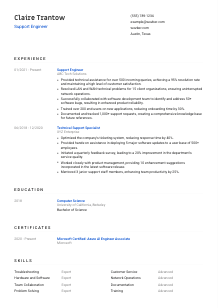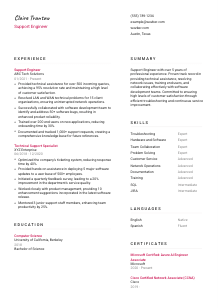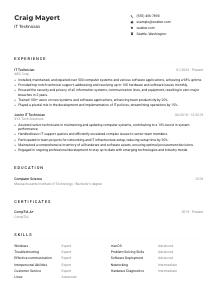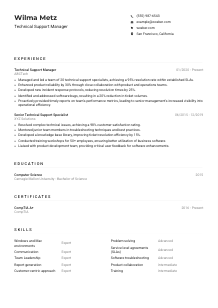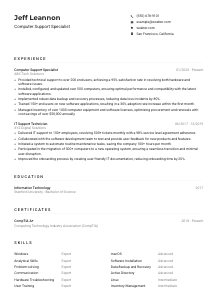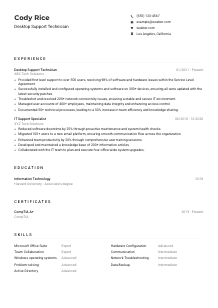Support Engineer CV Example
Bridging tech gaps, but your CV feels disconnected? Check this Support Engineer CV example, fine-tuned with Wozber free CV builder. Discover how to integrate your troubleshooting talents with job needs, building a career that's as supported as your apps!
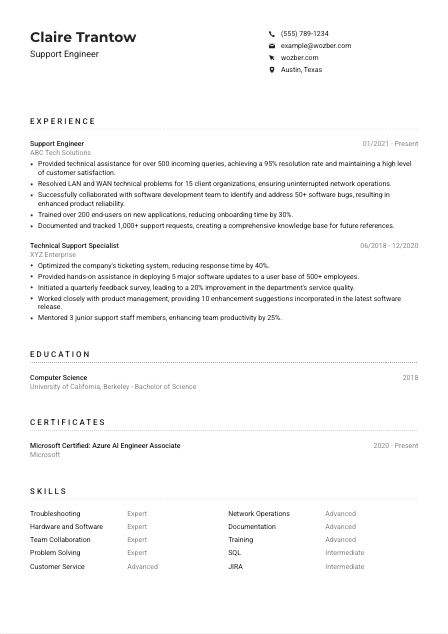
How to write a Support Engineer CV?
Embarking on the journey to land your dream job as a Support Engineer? The first checkpoint in this adventure is crafting a CV that not only reflects your expertise but also speaks directly to the needs of your prospective employer. With the help of Wozber's free CV builder, this guide is engineered to help you fine-tune your CV with precision. From leveraging ATS-friendly CV templates to ensuring ATS optimisation, we'll navigate through turning your CV into a beacon for hiring managers.
Ready to plug in and power up your job search? Let's get you set up for success!
Personal Details
The 'Personal Details' section of your CV might seem like just a formality, however, for a Support Engineer, it's the first signal of alignment with technical precision and attention to detail. Let's bold your credentials effectively, ensuring you spark interest right from the start.
1. Stand Out with Your Name
Begin with ensuring your name is prominently displayed. Think of it as the domain name to your personal brand's website – easily identifiable and memorable. Ensure the font is clear, professional, and a touch larger than the rest of your text.
2. Job Title Alignment
Immediately below your name, echo the job title you're applying for, in this case, "Support Engineer". This is a subtle but effective way of showing alignment and instantly clarifying your professional aim.
3. The Right Contact Info
Providing your most reliable contact number and a professional email (think firstname.lastname@email.com) shows you're easily contactable and serious about the role. Details matter in support engineering, and it starts here.
4. Location Highlight
For jobs that require specific location criteria, like our Austin, Texas-based Support Engineer role, stating your locality upfront meets one of the employer's checklist items straight away. It indicates logistical simplicity.
5. Professional Links
If you have a LinkedIn profile or a personal website that showcases your professional portfolio or certifications, include it. In today's world, having an online footprint can be as crucial as the CV itself, particularly in tech fields.
Takeaway
With your personal details finely tuned to signal your readiness and fit for the Support Engineer position, you've laid the foundational cable. Remember, these details are more than just a formality; they're your first handshake with potential employers. Make it count and ensure it's indicative of your attention to detail and technical expertise.





Experience
In the tech world, your experience is the core processor of your CV, driving home your capability and fit. For a Support Engineer role, it's about highlighting not just what you've done, but how what you've done aligns with what you'll be doing.
- Provided technical assistance for over 500 incoming queries, achieving a 95% resolution rate and maintaining a high level of customer satisfaction.
- Resolved LAN and WAN technical problems for 15 client organisations, ensuring uninterrupted network operations.
- Successfully collaborated with software development team to identify and address 50+ software bugs, resulting in enhanced product reliability.
- Trained over 200 end‑users on new applications, reducing onboarding time by 30%.
- Documented and tracked 1,000+ support requests, creating a comprehensive knowledge base for future references.
- Optimised the company's ticketing system, reducing response time by 40%.
- Provided hands‑on assistance in deploying 5 major software updates to a user base of 500+ employees.
- Initiated a quarterly feedback survey, leading to a 20% improvement in the department's service quality.
- Worked closely with product management, providing 10 enhancement suggestions incorporated in the latest software release.
- Mentored 3 junior support staff members, enhancing team productivity by 25%.
1. Dissecting the Job Requirements
Every bullet point in the job description is a clue. For a Support Engineer, experience in "providing technical assistance" and "resolving network issues" were key highlights. Start by pinpointing these elements and matching them with your experience.
2. The Layout
Organize your experience chronologically, beginning with the most recent. Clearly state your position, the company, and the duration of your tenure. This structure not only makes it easy to read but also illustrates your career trajectory.
3. Achievement Focus
For each role, draft accomplishment statements that mirror the Support Engineer requirements. Did you significantly improve resolution rate? Did your troubleshooting reduce system downtime? Highlight these successes with quantifiable outcomes.
4. Quantifiable Success
Numbers speak louder than words. By quantifying achievements – such as "achieved a 95% resolution rate" or "trained over 200 end-users", you lend credibility and scale to your accomplishments, making your contributions tangible.
5. Relevant Richness
While it's tempting to detail every task you've ever tackled, focus on the responsibilities that align most closely with the job you're applying for. Remember, relevance trumps volume, and every line should echo your suitability for the role.
Takeaway
Curating your experience with a laser focus on relevance and impact transforms this section into a compelling narrative of your suitability for the Support Engineer role. Engage the hiring manager with your story of technical achievements and problem-solving prowess. This is where your past work demonstrates future value.
Education
While the experience section is the heart of your technical capabilities, your education background lays down the theoretical foundation. For Support Engineer roles, showing a robust grounding in Computer Science or a related field is key.
1. Educational Essentials
The job description specifically asks for a "Bachelor's degree in Computer Science, Information Technology, or a related field." Make sure your education section starts with this requirement if it applies to you. This direct match sets a strong opening statement.
2. Structured Simplicity
Present your educational background in a straightforward format: degree, field of study, followed by the institution and graduation date. A clear layout enables the hiring manager to quickly verify your educational qualifications.
3. Degree Detailing
Given that the role specifically demands a Bachelor's in Computer Science or a related field, ensure your degree is listed accurately. If your degree is directly relevant, it's not just another line on your CV; it's a beacon of your qualified background.
4. Coursework Consideration
For newer entrants to the field, or if your degree is a close fit but not a direct match, highlighting relevant coursework can bridge the gap. Include any specialized courses that align with the demands of a Support Engineer role.
5. Additional Achievements
Have you excelled in areas directly relevant to the Support Engineer role during your academic career? Mention these achievements, especially if you've engaged in projects or activities that highlight your technical and troubleshooting skills.
Takeaway
Your education section should echo the foundation of your candidacy for the Support Engineer position. By aligning your academic credentials and accomplishments with the role's requirements, you underline your readiness to transition from theory to hands-on technical support.
Certificates
In the fast-evolving tech landscape, certifications serve as additional proof of your expertise and continual learning. For a Support Engineer, holding certifications like "Microsoft Certified: Azure AI Engineer Associate" or "CCNA" is a valuable advantage.
1. Matching Certifications with Job Requirements
Review the job description and note any specified or implied certifications. Highlighting the "Microsoft Certified: Azure AI Engineer Associate" and "Cisco Certified Network Associate (CCNA)" directly responds to the 'plus' qualifications of the job ad.
2. Quality Over Quantity
It's tempting to list all certifications you've earned. However, prioritize those most relevant to the Support Engineer position. This targeted approach ensures your CV speaks directly to the role's needs, making your qualifications stand out.
3. Date Details
For certifications, especially in technology, validity matters. Indicated dates show your credentials are current, underlining your dedication to staying up-to-date in a rapidly changing field.
4. Continuous Learning
Tech fields are dynamic, and continual learning is key. Engage in regular certification updates and new learning opportunities that enhance your qualifications as a Support Engineer. It shows commitment and forward-thinking.
Takeaway
Your certifications are like specialized tools in your Support Engineer toolkit; they equip you with the latest skills and knowledge. Highlighting relevant, up-to-date certifications on your CV signals your commitment to excellence and ongoing professional development.
Skills
The 'Skills' section of your CV isn't just a list; it's a curated showcase of your capabilities tailored for the Support Engineer role. Here, precision and relevance are your allies in creating a connection between your abilities and the job's needs.
1. Unpacking the Job Requirements
Take a moment to sift through the job listing for explicit and implicit skills. For a Support Engineer, it's clear that "Troubleshooting" and "Problem Solving" are critical, along with technical skills such as understanding "LAN/WAN networks".
2. Aligning Your Arsenal
Match your skills with those demanded by the role. For example, if "Hardware and Software Troubleshooting" is a required skill, and you're proficient, ensure it's prominently listed. This direct correspondence showcases your fit for the role.
3. Organisation and Focus
Keep your skills section organized and focused. Listing every skill you possess can dilute the impact of the ones most relevant to the Support Engineer position. Prioritize skills that reflect the immediate needs of the role and your expertise in those areas.
Takeaway
Think of the 'Skills' section as your professional highlight reel, each skill a highlight of your professional capability. Tailor it to resonate with the Support Engineer role, letting each listed skill affirm your readiness and suitability for the challenges ahead.
Languages
In today's global tech environment, communication skills, including language proficiency, can significantly enhance your ability to collaborate and troubleshoot. Let's align your linguistic capabilities with the expectations of a Support Engineer role.
1. Job Specification Check
First, determine if the job specifies particular language requirements. For the Support Engineer role, "the ability to use English effectively in a professional setting" is clearly outlined. This becomes a priority in your languages section.
2. Highlight Key Languages
Since the job emphasizes English proficiency, list it at the top of your language skills, accompanied by a clear indication of your level. If you're a native speaker or have professional fluency, make sure this is clearly stated.
3. Additional Languages
If you're proficient in other languages, include them as additional assets. This can showcase your ability to work in diverse teams and global settings, a plus in many tech environments.
4. Honest Proficiency Indication
Be truthful about your language levels. Misrepresenting your ability can lead to challenges down the line. Use clear terms like 'Native', 'Fluent', 'Intermediate', or 'Basic' to describe your proficiency.
5. Understanding the Global Scope
If the role has an international dimension or involves collaboration with global teams, your language skills can significantly boost your candidacy. Even if not explicitly stated, being multilingual in tech can open doors and foster better connections.
Takeaway
Your linguistic skills are more than just personal achievements; they're tools that enhance your capability as a Support Engineer in a globalized world. Highlighting your language proficiencies, especially those relevant to the role, can distinguish your CV and widen your professional network. Keep learning, keep communicating!
Summary
A well-crafted summary is the gateway to your CV, inviting hiring managers to dive deeper into your qualifications. For a Support Engineer, it's your chance to connect the dots between their needs and your experience, setting the stage for your detailed achievements.
1. Capture the Job's Core
Begin by absorbing the essence of the Support Engineer role. Understand the balance between technical expertise and customer service skills required, and reflect this blend in your summary.
2. Opening Statement
Kick off your summary with a broad yet engaging statement about your professional realm and background. "Support Engineer with over 5 years of professional experience" immediately situates you within the field.
3. Core Skills and Achievements
Weave in a few of your core skills and key achievements that directly respond to the job's requirements. This creates a mini-narrative of your professional impact and your capabilities in areas critical to the Support Engineer role.
4. Conciseness is Key
Keep your summary succinct and impactful. Aim for 3-5 lines that encapsulate your essence as a Support Engineer, drawing the hiring manager in and setting the tone for the details that follow in your CV.
Takeaway
Your summary is the potent prelude to the extensive qualifications detailed in your CV. For a Support Engineer, it's about balancing technical acumen with problem-solving prowess. Tailoring this section to the role's requirements not only demonstrates your alignment but also your eagerness to contribute and make a difference. Let it invite the reader in, setting the scene for your valuable contributions.
Launching Your Support Engineer Journey
You've now navigated through crafting a CV that resonates with the essence of a Support Engineer role. With these tailored sections, from personal details to summary, each part of your CV is calibrated to showcase your fit for the position. Utilizing Wozber's free CV builder, including its ATS-friendly CV templates and ATS CV scanner, ensures that your CV not only speaks to hiring managers but does so in the language of today's recruitment technology.
Your journey to landing that Support Engineer position is well underway - your CV is your passport, and you're ready for takeoff. All the best as you launch into this exciting career trajectory!

- Bachelor's degree in Computer Science, Information Technology, or a related field.
- Minimum of 3 years of experience in technical support or a related field.
- Strong proficiency in troubleshooting software and hardware issues.
- Excellent communication and customer service skills.
- Relevant certifications such as Microsoft Certified: Azure AI Engineer Associate or Cisco Certified Network Associate (CCNA) are a plus.
- Ability to use English effectively in a professional setting.
- Must be located in Austin, Texas.
- Provide technical assistance and support for incoming queries and issues related to computer systems, software, and hardware.
- Resolve technical problems with Local Area Networks (LAN), Wide Area Networks (WAN), and other systems.
- Collaborate with software developers to identify and fix software bugs.
- Train end-users on new applications and procedures.
- Document and track all support requests and resolutions for future reference.





